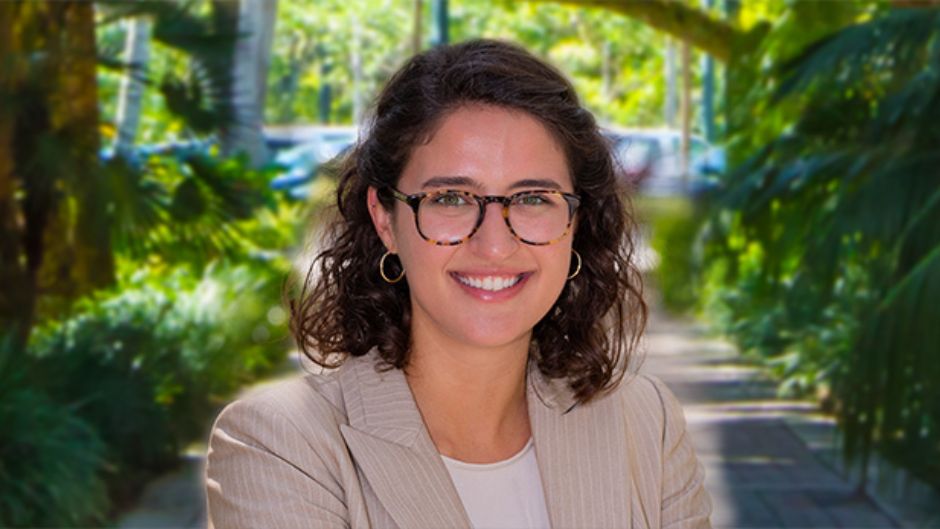Children & Youth Law Clinic Fellow and Miami Public Interest Scholar Alex Cinney came to law school wanting to do child advocacy and family law. "The Children & Youth Law Clinic is a big reason I chose Miami Law,” she says. The 3L’s recent presentation at the American Bar Association National Conference on Parent Representation in Tysons, Virginia, is the capstone to real-world law school experiences that launched her legal career in the child welfare system – the state’s intervention for allegations of child abuse or neglect by a caregiver.
In the presentation “Antiracist Lawyering: A Concrete Toolkit,” Cinney spoke to a ballroom full of lawyers, social workers, and parents in the child welfare system about the need for the legal community to respond to racial bias, disproportionality, and disparity in the system. Cinney presented alongside experienced attorneys Phyllis Stricklan of the Children’s Law Center of California and Susan Jacobs of the National Alliance for Parent Representation Steering Committee.
“I was so proud,” said Kele Stewart, professor and co-director of the Children & Youth Law Clinic, who sat beaming in the audience. “Alex is doing sophisticated system reform advocacy and education. She is already functioning like an experienced attorney."
Cinney worked on the toolkit while serving as a HOPE Summer Fellow with the American Bar Association Center on Children and the Law in Washington, D.C., during the summer of 2021. She excelled as a summer intern with the organization. She continued during the school year as co-chair of the Family Justice Initiative workgroup tasked with creating the toolkit for parent and child attorneys across the country. Mimi Laver, the director of legal representation at the Center on Children and the Law, said, “Alex joined the Center with much more experience with the child welfare system than our typical intern. I am grateful for Alex’s work on this project as I know the toolkit will help advance antiracist advocacy across the country.” The academic-year remote externship with the ABA was part of Miami Law’s D.C. Semester in Practice Program.
During her 3L year, Cinney also worked as a fellow in the Children & Youth Law Clinic, where she had interned during her second year. “The clinic has prepared me for my future career as a family defender. My experiences as an intern and as a current fellow have provided me with a deep understanding of the issues facing people living in poverty who are involved in the child welfare and related systems. My time with the clinic, as well as my internship with the Center on Children and the Law, has made me re-think some fundamental ways I viewed the system before coming to law school,” said Cinney.
There is an urgent need to address the overrepresentation of children of color in the child welfare system and systemic racism. Black children are 14% of the child population but makeup 23% of the child welfare population. In contrast, American Indian and Alaska Native children are represented in foster care at two times their rate in the national population. While not overrepresented nationally, Hispanic children are overrepresented in some places. “Most children are removed from their parents for poverty-related reasons. The trauma of being separated from their families and the system’s chronic failure to effectively address their needs creates more harm than good,” said Stewart.
The toolkit presentation served as an introduction to the Family Justice Initiative’s work on various materials included in the final toolkit. Stricklan said, “Alex has been instrumental in conceptualizing, developing, and organizing the various ideas and sections in the toolkit. Her interest and openness in making sure the toolkit operates in a manner to achieve effective results for parent and child clients is impressive. Alex has been great to work with because she is smart, has a great work ethic, and attitude.”
Cinney, along with the other conference presenters, showcased scripts, briefs, and motion templates for advocates to use in support of their arguments in court. The presentation also included a collection of narratives gathered by Cinney and her colleagues in the workgroup from leading family defense organizations across the country about their experiences of becoming antiracist in their advocacy, parents with lived experience in the system, and former foster youth about their experiences as people of color within the system. The presentation wrapped up with live feedback and suggestions from the audience for their incorporation into the final stages of the toolkit’s development.
Cinney looks forward to pursuing postgraduate work in this field once she graduates in May.
Read more about Miami Law's Children & Youth Law Clinic
Read more about studying social justice and public interest

